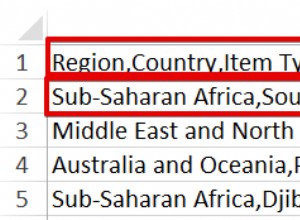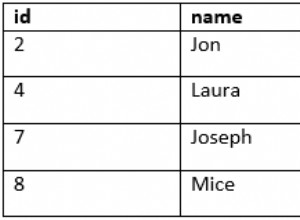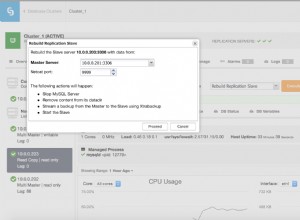Sono riuscito a ottenere la funzione originale per produrre la linea Base64 eseguendo il casting come tale:
$stmt = $this->con->prepare("SELECT owner, pet_name, last_seen, contact, description, CAST(photo as CHAR(1000000) CHARACTER SET utf8) as photo, location FROM Pets");
Sebbene ciò consentisse la ricezione della stringa Base64, includeva comunque i caratteri indesiderati. I caratteri indesiderati sono stati causati da JSON_ENCODE. Di seguito è riportato ciò che ho usato per risolverlo.
Fondamentalmente, 1. rimuovi i caratteri aggiunti e 2. indica a JSON_ENCODE di non stampare i caratteri di escape con JSON_UNESCAPED_SLASHES.
Per la funzione getReports()
function getReports() {
$stmt = $this->con->prepare("SELECT owner, pet_name, last_seen, contact, description, CAST(photo as CHAR(1000000) CHARACTER SET utf8) as photo, location FROM Pets");
$stmt->execute();
$stmt->bind_result($owner, $pet_name, $last_seen, $contact, $description, $photo, $location);
$reports = array();
while($stmt->fetch()) {
$report = array();
$report['owner'] = $owner;
$report['pet_name'] = $pet_name;
$report['last_seen'] = $last_seen;
$report['contact'] = $contact;
$report['description'] = $description;
$photo = str_replace("\n","",$photo);
$photo = str_replace("\\/","/", $photo);
$photo = stripcslashes($photo);
$report['photo'] = $photo;
$report['location'] = $location;
array_push($reports, $report);
}
return $reports;
}
E nello script Api, hai cambiato il ritorno da
echo json_encode($resultArray);
a
echo json_encode($resultArray, JSON_UNESCAPED_SLASHES);
Ora funziona tutto alla grande. È questa la migliore pratica? Non sono sicuro. Sono certo che l'archiviazione di base64 probabilmente non lo è...




